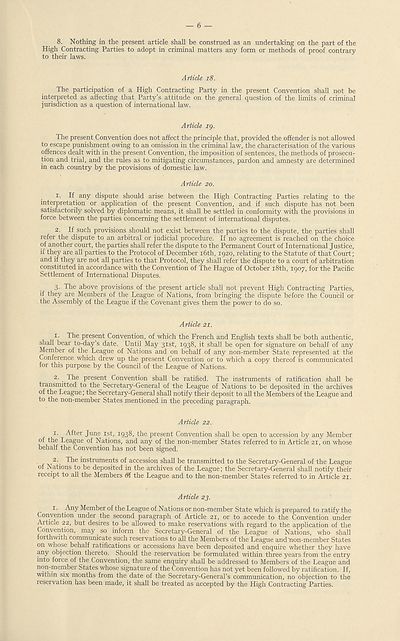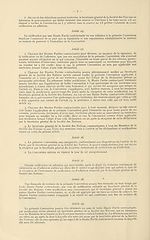Download files
Complete book:
Individual page:
Thumbnail gallery: Grid view | List view

— 6 —
8. Nothing in the present article shall be construed as an undertaking on the part of the
High Contracting Parties to adopt in criminal matters any form or methods of proof contrary
to their laws.
Article 18.
The participation of a High Contracting Party in the present Convention shall not be
interpreted as affecting that Party’s attitude on the general question of the limits of criminal
jurisdiction as a question of international law.
Article ig.
Ihe present Convention does not affect the principle that, provided the offender is not allowed
to escape punishment owing to an omission in the criminal law, the characterisation of the various
offences dealt with in the present Convention, the imposition of sentences, the methods of prosecu¬
tion and trial, and the rules as to mitigating circumstances, pardon and amnesty are determined
in each country by the provisions of domestic law.
Article 20.
1. If any dispute should arise between the High Contracting Parties relating to the
interpretation or application of the present Convention, and if such dispute has not been
satisfactorily solved by diplomatic means, it shall be settled in conformity with the provisions in
force between the parties concerning the settlement of international disputes.
2. If such provisions should not exist between the parties to the dispute, the parties shall
refer the dispute to an arbitral or judicial procedure. If no agreement is reached on the choice
of another court, the parties shall refer the dispute to the Permanent Court of International Justice,
if they are all parties to the Protocol of December 16th, 1920, relating to the Statute of that Court;
and if they are not all parties to that Protocol, they shall refer the dispute to a court of arbitration
constituted in accordance with the Convention of The Hague of October 18th, 1907, for the Pacific
Settlement of International Disputes.
3. The above provisions of the present article shall not prevent High Contracting Parties,
if they are Members of the League of Nations, from bringing the dispute before the Council or
the Assembly of the League if the Covenant gives them the power to do so.
Article 21.
1. The present Convention, of which the French and English texts shall be both authentic,
shall bear to-day’s date. Until May 31st, 1938, it shall be open for signature on behalf of any
Member of the League of Nations and on behalf of any non-member State represented at the
Conference which drew up the present Convention or to which a copy thereof is communicated
for this purpose by the Council of the League of Nations.
2. The present Convention shall be ratified. The instruments of ratification shall be
tiansmitted to the Secretary-General of the League of Nations to be deposited in the archives
of the League; the Secretary-General shall notify their deposit to all the Members of the League and
to the non-member States mentioned in the preceding paragraph.
Article 22.
1. After June 1st, 1938, the present Convention shall be open to accession by any Member
of the League of Nations, and any of the non-member States referred to in Article 21, on whose
behalf the Convention has not been signed.
2- The instruments of accession shall be transmitted to the Secretary-General of the League
of Lations to be deposited in the archives of the League; the Secretary-General shall notify their
receipt to all the Members of the League and to the non-member States referred to in Article 21.
Article 23.
1. Any Member of the League of Nations or non-member State which is prepared to ratify the
Convention under the second paragraph of Article 21, or to accede to the Convention under
Article 22, but desires to be allowed to make reservations with regard to the application of the
Convention, may so inform the Secretary-General of the League of Nations, who shall
forthwith communicate such reservations to all the Members of the League and‘non-member States
on whose behalf ratifications or accessions have been deposited and enquire whether they have
any objection thereto. Should the reservation be formulated within three years from the entry
into force of the Convention, the same enquiry shall be addressed to Members of the League and
non-member States whose signature of the Convention has not yet been followed by ratification. If,
within six months from the date of the Secretary-General’s communication, no objection to the
reservation has been made, it shall be treated as accepted by the High Contracting Parties.
8. Nothing in the present article shall be construed as an undertaking on the part of the
High Contracting Parties to adopt in criminal matters any form or methods of proof contrary
to their laws.
Article 18.
The participation of a High Contracting Party in the present Convention shall not be
interpreted as affecting that Party’s attitude on the general question of the limits of criminal
jurisdiction as a question of international law.
Article ig.
Ihe present Convention does not affect the principle that, provided the offender is not allowed
to escape punishment owing to an omission in the criminal law, the characterisation of the various
offences dealt with in the present Convention, the imposition of sentences, the methods of prosecu¬
tion and trial, and the rules as to mitigating circumstances, pardon and amnesty are determined
in each country by the provisions of domestic law.
Article 20.
1. If any dispute should arise between the High Contracting Parties relating to the
interpretation or application of the present Convention, and if such dispute has not been
satisfactorily solved by diplomatic means, it shall be settled in conformity with the provisions in
force between the parties concerning the settlement of international disputes.
2. If such provisions should not exist between the parties to the dispute, the parties shall
refer the dispute to an arbitral or judicial procedure. If no agreement is reached on the choice
of another court, the parties shall refer the dispute to the Permanent Court of International Justice,
if they are all parties to the Protocol of December 16th, 1920, relating to the Statute of that Court;
and if they are not all parties to that Protocol, they shall refer the dispute to a court of arbitration
constituted in accordance with the Convention of The Hague of October 18th, 1907, for the Pacific
Settlement of International Disputes.
3. The above provisions of the present article shall not prevent High Contracting Parties,
if they are Members of the League of Nations, from bringing the dispute before the Council or
the Assembly of the League if the Covenant gives them the power to do so.
Article 21.
1. The present Convention, of which the French and English texts shall be both authentic,
shall bear to-day’s date. Until May 31st, 1938, it shall be open for signature on behalf of any
Member of the League of Nations and on behalf of any non-member State represented at the
Conference which drew up the present Convention or to which a copy thereof is communicated
for this purpose by the Council of the League of Nations.
2. The present Convention shall be ratified. The instruments of ratification shall be
tiansmitted to the Secretary-General of the League of Nations to be deposited in the archives
of the League; the Secretary-General shall notify their deposit to all the Members of the League and
to the non-member States mentioned in the preceding paragraph.
Article 22.
1. After June 1st, 1938, the present Convention shall be open to accession by any Member
of the League of Nations, and any of the non-member States referred to in Article 21, on whose
behalf the Convention has not been signed.
2- The instruments of accession shall be transmitted to the Secretary-General of the League
of Lations to be deposited in the archives of the League; the Secretary-General shall notify their
receipt to all the Members of the League and to the non-member States referred to in Article 21.
Article 23.
1. Any Member of the League of Nations or non-member State which is prepared to ratify the
Convention under the second paragraph of Article 21, or to accede to the Convention under
Article 22, but desires to be allowed to make reservations with regard to the application of the
Convention, may so inform the Secretary-General of the League of Nations, who shall
forthwith communicate such reservations to all the Members of the League and‘non-member States
on whose behalf ratifications or accessions have been deposited and enquire whether they have
any objection thereto. Should the reservation be formulated within three years from the entry
into force of the Convention, the same enquiry shall be addressed to Members of the League and
non-member States whose signature of the Convention has not yet been followed by ratification. If,
within six months from the date of the Secretary-General’s communication, no objection to the
reservation has been made, it shall be treated as accepted by the High Contracting Parties.
Set display mode to:
![]() Universal Viewer |
Universal Viewer | ![]() Mirador |
Large image | Transcription
Mirador |
Large image | Transcription
Images and transcriptions on this page, including medium image downloads, may be used under the Creative Commons Attribution 4.0 International Licence unless otherwise stated. ![]()
| League of Nations > Legal > Convention pour la prévention et la répression du terrorisme > (11) |
|---|
| Permanent URL | https://digital.nls.uk/191519407 |
|---|
| Shelfmark | LN.V |
|---|
| Description | Over 1,200 documents from the non-political organs of the League of Nations that dealt with health, disarmament, economic and financial matters for the duration of the League (1919-1945). Also online are statistical bulletins, essential facts, and an overview of the League by the first Secretary General, Sir Eric Drummond. These items are part of the Official Publications collection at the National Library of Scotland. |
|---|---|
| Additional NLS resources: |
|

